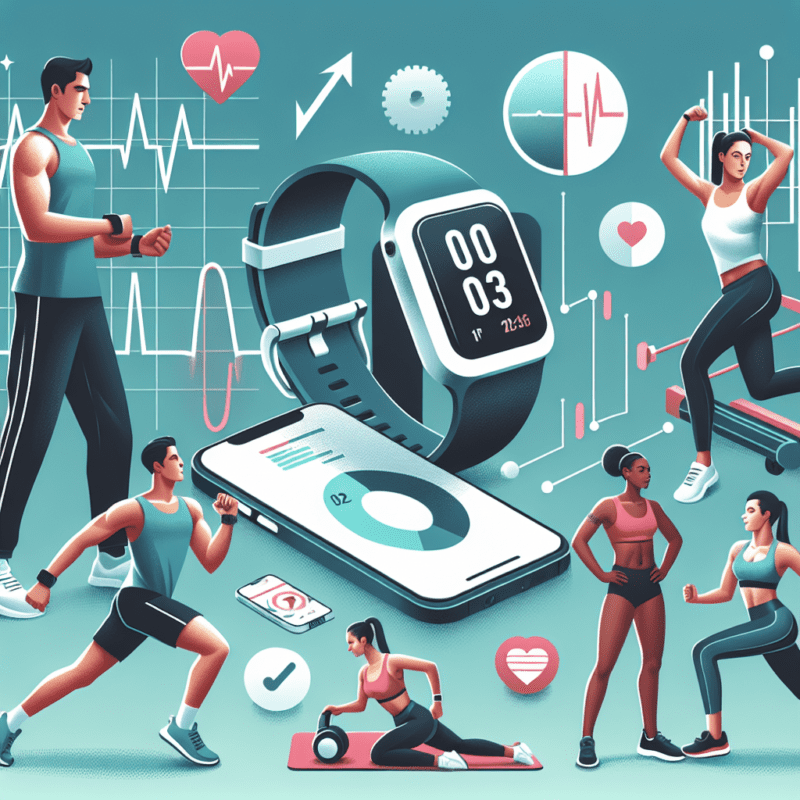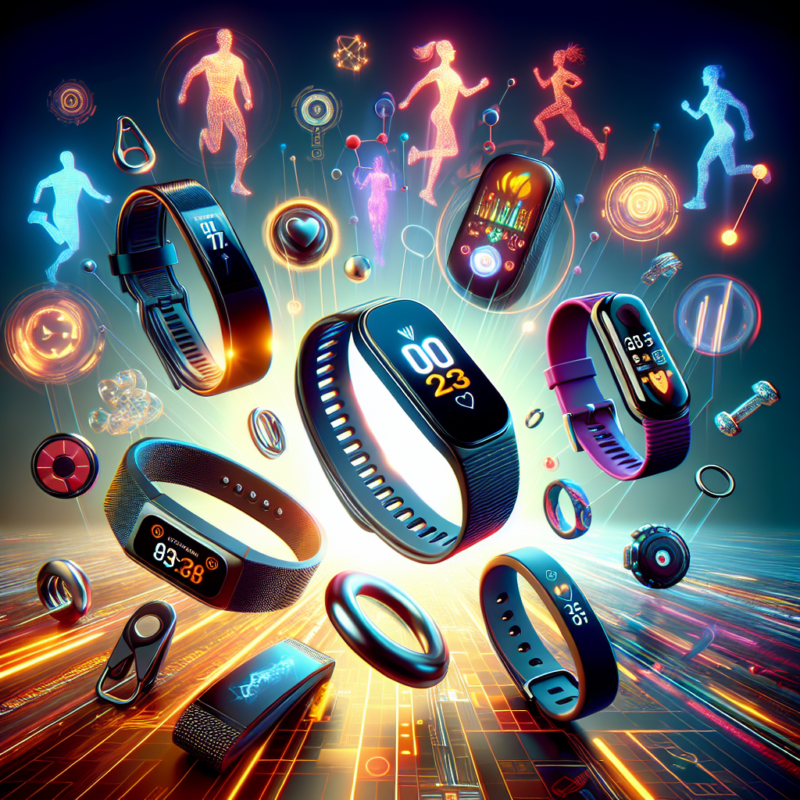Choosing the Perfect Fitness Tracker: Finding the Right Fit for Your Lifestyle
In the age of technology, fitness trackers have transformed the way we approach health and wellness. These innovative devices not only track physical activity but also monitor various health metrics, helping users make informed choices. With so many options available, determining the right device for your lifestyle can feel overwhelming. This article will delve into the comparison of fitness trackers: which device fits your lifestyle best? We will explore the different types of fitness trackers, their features, and how to select the perfect one based on your personal needs and goals.
Understanding Fitness Trackers: Types and Features
Fitness trackers come in various forms, including wristbands, smartwatches, and clip-on devices, each serving different purposes and audiences. Wristbands are typically lightweight and designed primarily for activity tracking, while smartwatches combine fitness tracking with traditional smartwatch features like notifications and music control. Clip-on devices, on the other hand, are more discreet and can be attached to clothing, making them an ideal choice for individuals who prefer a lower profile while monitoring their activity levels.
When comparing fitness trackers, it’s important to consider key features that differentiate them. Heart rate monitoring, GPS tracking, sleep tracking, and compatibility with mobile apps are some of the most sought-after functionalities. A good fitness tracker should support your fitness level and goals, whether you’re a casual walker, an avid runner, or someone looking to improve their overall health. Moreover, consider the device’s battery life and durability, as these aspects greatly influence usability in everyday life.
Key Factors to Consider When Choosing a Fitness Tracker
One of the most crucial factors to consider is user interface and ease of use. A fitness tracker that is intuitive and simple to navigate can enhance your experience and encourage consistent usage. Look for features like touchscreen displays, customizable watch faces, and straightforward syncing options with your smartphone. Moreover, user reviews can provide valuable insights into how easy or challenging the device is to use, helping you make an informed decision.
Another significant consideration is your specific fitness goals. Are you focused on weight loss, improved endurance, or general health tracking? Different fitness trackers prioritize various metrics. For instance, runners might prefer a tracker with advanced GPS features and pace analysis, while someone interested in overall wellness may look for comprehensive health monitoring tools, like stress tracking and menstrual cycle tracking. Identifying what you want to achieve will navigate you toward a device that aligns with your ambitions.
Popular Fitness Trackers and Their Unique Features
Several leading brands dominate the fitness tracker market, each offering unique features tailored to different user needs. For instance, Fitbit is renowned for its comprehensive health tracking capabilities, including heart rate monitoring, sleep analysis, and a vast array of exercise modes. Their devices also come equipped with social features, allowing users to compete and engage with friends, making fitness more enjoyable and communal.
On the other hand, Garmin is a top choice for serious athletes. Garmin fitness trackers are known for their specialized functions, such as advanced GPS tracking and training analytics. Many of their devices cater specifically to running, cycling, and swimming enthusiasts, offering insights that can help improve performance and endurance. For those interested in larger ecosystems, Apple’s fitness trackers integrate seamlessly with the iPhone and Apple Health app, offering a range of health metrics alongside smartwatch features.
In addition to popular brands like Fitbit and Garmin, emerging competitors such as WHOOP and Oura Ring focus on niche areas of health and fitness. WHOOP is designed around performance optimization, emphasizing recovery and strain management, while Oura Ring targets sleep tracking and overall health insights in a stylish ring form factor. These options demonstrate the increasing diversity of the fitness tracker market and how brands cater to specific needs and preferences.
The Importance of Accuracy and Data Insights
Accuracy is a paramount concern when selecting a fitness tracker, as the validity of the data collected can impact your fitness journey significantly. Most trackers provide elements like step counts, calories burned, and heart rate measurements, but the precision of these readings can vary across devices. It’s essential to look for reviews and scientific evaluations to understand how well a device performs in tracking specific metrics.
Data insights are just as important as the accuracy of data collection. Some trackers provide valuable feedback on your daily activity levels, suggesting personalized challenges or goals that can motivate you to reach your targets. For example, many devices offer reminders to move after a period of inactivity or highlight trends in your sleep patterns to help improve rest quality. The best fitness trackers integrate this data into insights that guide you toward healthier habits rather than just presenting numbers.
Another factor influencing the value of collected data is the ecosystem of apps and community engagements that accompany fitness trackers. A well-designed app can enhance the user experience by providing motivational content, structured goal-setting options, and the ability to share progress with friends, making fitness a more social activity. Look for platforms that foster community support, knowledge sharing, and engagement to help you stay inspired on your wellness journey.
Budgeting for a Fitness Tracker: What Should You Expect to Pay?
When budgeting for a fitness tracker, the price range can vary significantly, influencing the number of features included. Entry-level models may be priced under $50, offering basic step counting and heart rate monitoring, which can be sufficient for casual users or those just starting their fitness journey. However, these budget devices often lack advanced features such as GPS tracking and detailed sleep analysis.
Mid-range fitness trackers typically range from $100 to $250. These devices often include more comprehensive health tracking metrics, smartphone notifications, and longer battery life. Brands like Fitbit and Garmin have several models in this category that cater to fitness enthusiasts, providing a good balance of functionality and value.
For serious athletes or tech-savvy individuals, premium fitness trackers can range from $250 to upwards of $400. These devices usually offer advanced tracking capabilities, additional sensors, premium materials, and extensive app integration. Investing in a higher-end device is worth considering if you are committed to pursuing specific fitness goals and require sophisticated data insights to help you succeed.
Conclusion
Choosing the right fitness tracker is a highly personal decision that depends on your individual lifestyle, fitness goals, and preferences. By considering various factors like features, accuracy, budget, and design, you can determine which device aligns best with your health and wellness aspirations. Whether you opt for a basic model, a mid-range tracker with advanced features, or a premium device equipped for serious athletics, the added data and insights can greatly enhance your journey towards a healthier, more active lifestyle.
Exploring the landscape of fitness trackers reveals a broad spectrum of choices catering to diverse needs. Understanding the unique features of popular brands like Fitbit, Garmin, Apple, WHOOP, and Oura Ring allows consumers to make informed choices, ensuring they invest in a device that fits their lifestyle. Ultimately, selecting the most suitable fitness tracker is about finding the perfect balance that supports your journey towards better health.
FAQs
What should I consider when comparing fitness trackers?
When comparing fitness trackers, consider factors such as your fitness level, the features you need, ease of use, accuracy of data, battery life, and compatibility with mobile apps.
Are more expensive fitness trackers always better?
Not necessarily. More expensive fitness trackers may offer advanced features and superior accuracy, but it depends on your fitness goals. Basic trackers can be sufficient for casual users.
Can I use a fitness tracker without a smartphone?
Most fitness trackers can initially be used without a smartphone, but many of their features and data syncing capabilities require app connectivity for full functionality.
How important is battery life in a fitness tracker?
Battery life is crucial, especially for those who engage in long activities or forget to charge their devices. Look for trackers with good battery longevity based on your usage patterns.
Can fitness trackers help improve my overall health?
Yes, fitness trackers can help improve your overall health by providing insights into your activity levels, sleep quality, and heart rate, motivating you to make healthier lifestyle choices.



